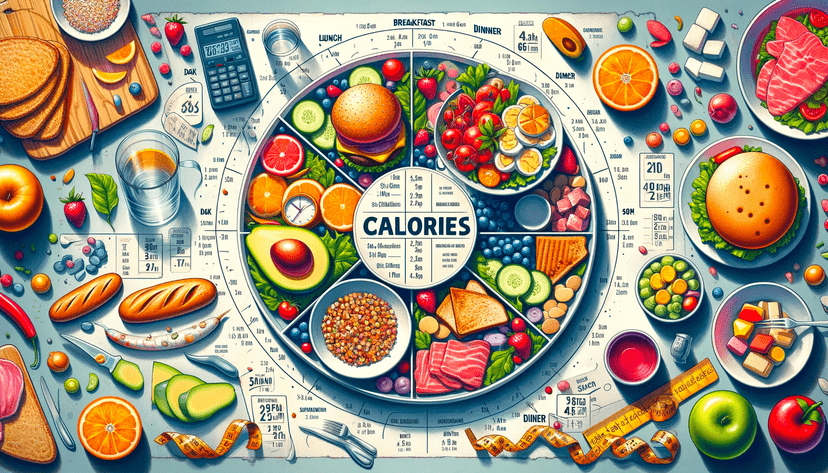Ways to Promote Emotional Well-being on Your Weight Loss Journey

Understanding the Emotional Challenges of Weight Loss
Embarking on a weight loss journey is not merely a physical ordeal, but it holds considerable psychological and emotional implications as well. For some people, losing weight is a process underscored by a series of emotional highs and lows. It is thus paramount to understand that experiencing these emotional and psychological challenges is an integral part of this journey. Rather than dismissing these feelings, acknowledging them and addressing them in a positive manner can significantly improve the weight loss process.
Recognizing Emotional Ups and Downs
Weight loss is not a linear process. It is indicative of a series of success and setbacks accompanied by fluctuating emotions. The thrill of losing a few pounds might be replaced by the disappointment of hitting a weight stagnation phase. Feeling enthusiastic about a gym session might be followed by a lack of motivation on other days. These emotional ups and downs are completely normal and form an integral part of the weight-loss journey. Recognition of these emotions is the first step towards managing them.
The Impact of Weight Loss on Self-Esteem and Body Image
One's perception of their body can significantly affect their self-esteem and overall mental health. It's important to remember that body image is subjective and can vary greatly from person to person. Losing weight can have dramatic impacts on body image and, in turn, on self-esteem. Some people might struggle to adjust to their new body size and experience mixed feelings towards their body during the process. It's important not to peg all your self-worth to weight loss, and remember that you are more than just the number on the scale.
Stress and Anxiety Associated with Dieting
Dieting can often be a source of stress and anxiety for many people. Making changes to your diet, constantly monitoring food intake, and worrying about restrictions can lead to an unhealthy relationship with food. Strict dieting can lead to feelings of deprivation, craving, and in some cases, disordered eating. It is crucial to maintain a balanced approach towards nutrition, keeping in mind that it's not about restriction, but about nourishing your body with wholesome, nutritious food.
In conclusion, understanding and acknowledging the emotional implications of weight loss can significantly ease the journey. Remember to be patient with yourself, have realistic expectations and most importantly, to prioritize your mental health and emotional well-being alongside your physical health. Remember, weight loss is not just about physical change, but embraces emotional betterment too.
Strategies for Emotional Well-Being
Navigating the journey of weight loss is as psychological as it is physical. One's emotional well-being plays a crucial role in this journey and adopting a few practices can significantly promote a healthy mindset. Here we offer some practical strategies to help maintain and promote emotional well-being while pursuing your weight loss goals.
Practicing Mindfulness and Meditation
Mindfulness and meditation are powerful tools that help connect you with the present moment, which is the first step to gaining clarity on your weight loss journey. They involve focusing on your current state and surroundings, leaving no room for destructive thoughts or feelings regarding the past or future.
The practice of mindfulness, a type of meditation, is shown to reduce binge eating and emotional eating, behaviors often linked with weight gain. It enables you to recognize your emotional and physical hunger cues, helping you make healthier choices.
For example, mindful eating encourages you to focus on the colors, smells, flavors, and textures of your food; to chew slowly and eliminate distractions, like electronics, during meals. This practice not only enriches the eating experience but also helps in recognizing satiety cues, thereby preventing overeating.
Engaging in Positive Self-Talk and Affirmations
Engaging in positive self-talk and affirmations is another effective strategy for emotional well-being. It's about shifting your mindset to a more positive one to help you overcome challenges and setbacks on your weight loss journey.
Negative self-talk can be distressing and counterproductive. Replace it with positive affirmations, which according to several studies, are effective in reducing stress and improving overall emotional well-being.
For example, instead of saying 'I will never reach my weight loss goal,' say to yourself, 'I'm taking consistent steps towards my weight loss goal.' Affirmations are most effective when spoken in the present tense and repeated multiple times a day, either silently or aloud.
Setting Realistic and Achievable Goals
Lastly, the key to a successful weight loss journey is setting realistic and achievable goals. Setting unreachable goals often leads to frustration and can benefit from re-evaluation.
Start by establishing short-term goals like a weekly 1% weight loss which would easily accumulate over time. This practice helps you stay motivated and see tangible results while avoiding the negative impact of falling short on loftier aspirations.
Weight loss is a gradual process that requires patience as your body adapts to new behaviors and changes. Recognize every small victory to build self-confidence and motivation to keep advancing towards your long-term goals.
In conclusion, embracing these strategies will evidently aid your weight loss journey: practicing mindfulness and meditation, nurturing positive self-talk and affirmations, and setting realistic goals. Combined, they bring about a holistic approach that takes into account not just physical weight loss, but emotional well-being as well.
Remember, self-compassion is crucial during this journey. Exercise kindness towards yourself and keep in mind that progress, not perfection, is the ultimate goal. Weight loss is a journey and each step, no matter how small, takes you closer to your goal.
Building a Supportive Environment
On your weight loss journey, your surroundings will largely influence and impact your emotional well-being. Having a supportive environment is key to instilling a sense of security, engaging in mindfulness, and ensuring a sustainable path towards your weight loss goals. This involves multiple layers of support systems, such as friends, family, and professionally recognized sources.
Emphasizing the point, we start by Leveraging Social Support Systems. The first line of emotional support often comes from the people we interact with on a daily basis. Your friends and family can provide an empathetic ear, and motivational feedback. Communicate your weight loss goals with them and discuss how they can assist you. Their encouragement can provide a massive boost to your self-esteem, fostering a positive mindset which in turn will help you adhere to your weight loss regimen. Involve them in your activities, invite them to join you on a walk or cook a healthy meal together. This practice can cultivate a shared understanding and mutual encouragement in your journey.
Next, we navigate towards Connecting with Like-minded Individuals. Embarking on a weight loss journey alone can be daunting and might make you susceptible to emotional distress. Engaging with a supportive community of individuals with similar goals can be incredibly beneficial. This could be in the form of face-to-face interactions in local weight loss groups and clubs, or virtual communities such as online forums and social media platforms. These sources offer a wealth of practical advice from real-life experiences of those on the same path as you. They can help normalize your struggles, provide inspiration, and offer encouragement during times when you may feel disheartened. The sense of belonging to such a community can greatly enhance your emotional well-being by ensuring you do not face the challenges of weight loss in isolation.
Our last stop is acknowledging the importance of Seeking Professional Support When Needed. While friends, family, and weight loss communities provide significant emotional support, certain situations might demand professional help. Licensed therapists and nutrition counselors possess the necessary expertise to cope with emotional distress related to weight loss, body image issues, and eating disorders. Therapists can provide cognitive-behavioral coping skills while dietitians can offer personalized meal plans and needed diet alterations. They are equipped to guide you through the mental challenges of weight loss, helping you navigate complex feelings, anxiety, and fostering a healthier mindset towards food and body image. In case of severe emotional distress, do not hesitate to reach out to these professionals. A healthy mind breeds a healthy body, and this additional layer of support can tremendously enhance your emotional well-being and assist you in achieving your weight loss goals.
To wrap up, building a supportive environment is crucial and the amalgamation of all these aspects, social support systems, connecting with others on the same journey, and seeking professional support when required, creates a well-rounded boost to your emotional well-being throughout your weight loss journey. All these elements put together make your path easier to tread on, emotionally enriching, and ultimately more successful.
In Summary
In summary, this post aims to shed light on the emotional aspects of weight loss journey.
Starting with understanding the emotional challenges of weight loss, we've learned that emotions fluctuate and that it's normal. Recognizing these changes and not pegging your self-worth to your weight are crucial. Also, dieting can bring about stress and anxiety but it's crucial to remember that it's not about food restrictions but about nourishing your body with wholesome and nutritious food.
We then moved onto strategies for emotional well-being during weight loss. These strategies included practicing mindfulness and meditation, engaging in positive self-talk and affirmations, and setting realistic and achievable goals.
In the final section, we discussed how you can build a supportive environment by leveraging your social support systems, connecting with like-minded individuals and seeking professional support when needed.
To put all this into action, here are the steps you should take:
- Start by acknowledging your emotional ups and downs. Accept them as part of the process.
- Focus on a balanced nutrition approach, not restriction. Switch to wholesome and nutritious food to nourish your body.
- Practice mindfulness and meditation to connect with your feelings and present state. Start with mindful eating to change your relationship with food.
- Positive self-talk and affirmations are crucial. Make a list of positive affirmations and start your day with them. Repeat them throughout the day.
- Set achievable goals based on your weight loss aspiration. Make these goals short term and keep them realistic.
- Share your weight loss goals with your friends and family. Their encouragement would keep you going.
- Join local weight loss groups or online forums of like-minded individuals. You will gain motivation and it'll act as an emotional cushion.
- If you feel overwhelmed, don’t hesitate to seek professional assistance. A good therapist or nutrition counselor can provide immense help.
Remember progress, not perfection is the ultimate goal. And above all, be kind to yourself on this journey. With these steps, you're ready to embark on a healthier and emotionally balanced weight loss journey.





